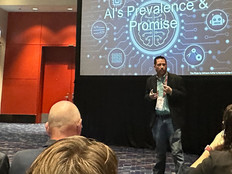The Rising Ed-Tech Expectations of the Continuing-Education Generation
Once dismissed as slackers in holey flannel shirts, members of Generation X are now midcareer professionals who pursue lifelong learning opportunities at impressive rates, according to a report released this spring.
Eleven percent of participants in the Longitudinal Study of American Youth (PDF download) — which tracks approximately 5,900 people who are now between the ages of 37 and 40 — are currently enrolled in formal schooling. While Gen Xers may not be digital natives in the way that most millennials are, they possess a comfort with technology (and with the Internet in particular) that previous generations lacked, says Jon Miller, the director of the study and a research scientist at the University of Michigan Institute for Social Research (ISR).
“Gen Xers have actually watched this technology emerge,” Miller says. “They were the first people to get on the boat, so to speak. I think most of them are fairly comfortable with it.”
New Expectations for Technology in the Classroom
Terry Mouchayleh, dean of the faculty academy at Tarrant County College in Fort Worth, Texas, says most younger adults simply assume their instructors will integrate technology into their instruction.
“I would say most Gen X and Gen Y students just expect it,” she says. “It’s like, ‘What do you mean we’re not using technology?’”
"What do you mean we’re not using technology?"
In particular, Mouchayleh says, students expect instructors to use an online learning management system, where they can check grades and access backups of syllabi and handouts — even when taking classes in person.
Catherine Anderson, senior program director at the University of Virginia’s School of Continuing and Professional Studies, agrees that Gen X students generally are more comfortable with such online systems than previous generations of students. But many of them still require additional support and training, especially if they’re taking an online class for the first time.
“We get a lot of frustration if they’re under the gun, trying to learn the interface at the same time they’re trying to keep up with assignments,” Anderson says.
The same issue crops up at Sinclair Community College in Dayton, Ohio. “I think that Gen Xers still maintain some apprehension toward technology. They are willing to get in there and do it, but they may ask a little bit more of us. They want us to make them more comfortable in that environment, and it’s our job to help them acclimate to it,” says Christi Amato, an academic coach.
A Changing Model of Higher Education
Percentage of Gen Xers who use the Internet, compared with 95 percent of millennials and 81 percent of younger boomers
SOURCE: “Generations 2010,” Pew Research Center’s Internet & American Life Project Surveys (2008–2010)
Sinclair Community College recently received a $12 million grant from the Department of Labor to revamp the college’s online courses for continuing-education students. The new classes, which debut in the fall, allow students to progress as soon as they’ve mastered the appropriate content, rather than waiting until the end of a semester to enroll in a new class.
According to Miller, education is no longer about providing students with a “warehouse” of information; it’s about teaching students to access and process the limitless information made available through technology.
Particularly in technical fields, such as medicine, auto mechanics or information technology, workers will continue to return to school to stay up to date, Miller says.
“If you are a plumber, whatever technology you use today will be a little old in five years, and probably not used in 10 years,” he says. “Education now is cyclical.”







